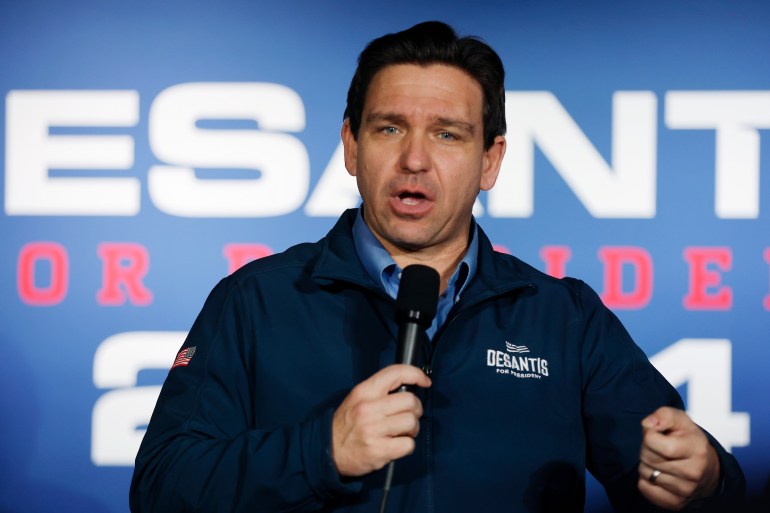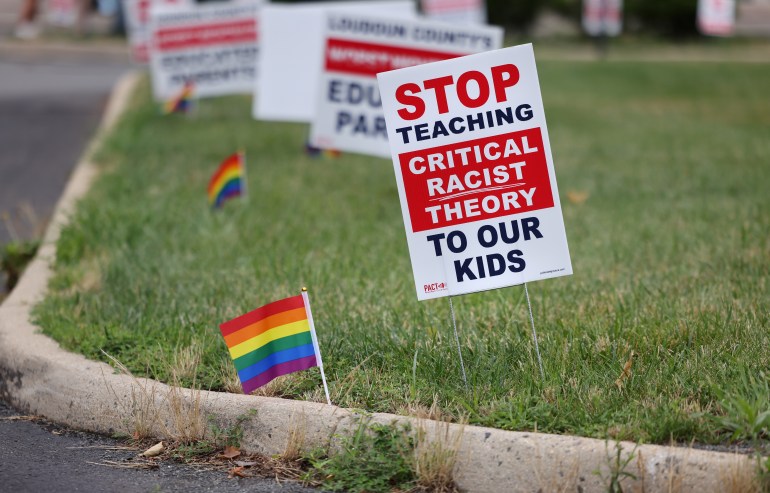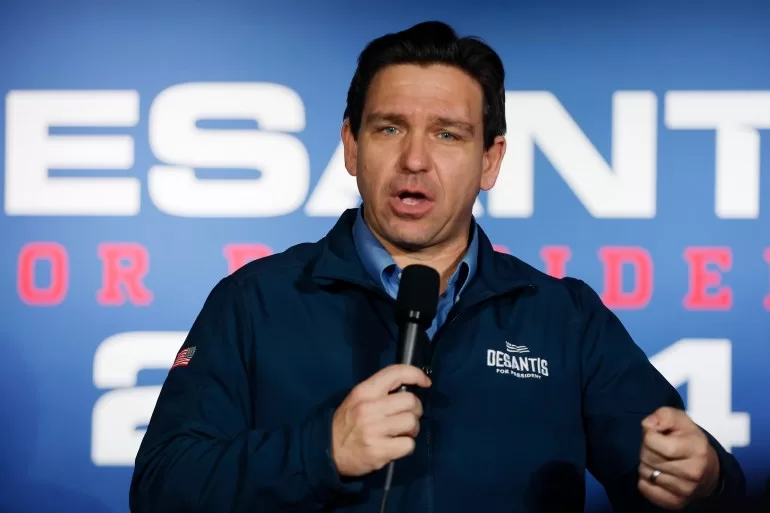A constitutional amendment on the ballot in November that would turn Florida’s school board elections into partisan races is stirring controversy among Democrats and educators, some of whom view it as a power play by the US state’s Republican Governor Ron DeSantis.
If the ballot question passes in the November general election, candidates for the school board would be required to list their political parties starting November 2026.
Making candidates stand on party tickets will infuse “dirty” politics – and big political spending – into races that should be focused on how to better educate children, say opponents of the proposition.
On the other hand, Republican lawmakers who spearheaded Amendment 1 argue that voters need to know candidates’ political affiliations to be properly informed.
“School board elections are one of the few political arenas left where our elected officials can leave their political party affiliations at the door and come together for the sake of our students,” said Florida public school teacher Grace Hayes when she joined educators in Tallahassee speaking out against partisan races last year.
“To force school board candidates to pick a partisan side in what is already such a hostile and complicated political climate is the worst thing we could do for our students, teachers and educational stakeholders,” she added.
Greater transparency
Florida House of Representatives member Spencer Roach, a Republican who sponsored a bill to put the constitutional amendment on the ballot, denied partisan races will help the Republican Party gain control of schools.
“It’s not about advancing the causes of Republicans or Democrats,” Roach said during the legislative debate. “It’s simply about transparency. I simply think, as policymakers, that we have an obligation to furnish to the voters as much information about a candidate as possible.”

The majority of the country’s school board races are nonpartisan, an effort to keep politics out of decisions on education and curriculum. But Florida’s conservative policies and ongoing cultural wars have lately become a playbook for other red states to follow.
Florida is the third most populous US state, and DeSantis has made national headlines for his presidential ambitions and tight political control of the levers of power in Tallahassee, the state capital.
Other politicians and education leaders across the United States are certainly paying close attention to Amendment 1’s outcome in the November 5 general election, though its chances of success may be slim, as it would require a 60 percent majority to pass.
Amendment 1 is on a packed ballot with a presidential race and other Florida ballot issues for legalising marijuana and abortion rights. The partisan school elections issue is easily overshadowed by them.
In recent times, Florida school boards have held sometimes-angry debates over politically loaded issues including book bans, bathroom policies for transgender students, the “Don’t Say Gay” legislation, and so-called “critical race theory“, an academic concept around the impact of the US’s history of racism. During the pandemic, COVID-19 masking rules and school reopening were also heated topics.

Political party endorsements
Both DeSantis and the Florida Democratic Party are already jumping into the nonpartisan school races and have endorsed several candidates across the state in the recent primary elections.
To say that school board races aren’t already partisan is laughable, said Florida House of Representatives legislator Randy Fine, a Republican and one of the leaders of the state’s conservative cultural cause.
“I feel like maybe people are living in the world of sunshine, rainbows, unicorns and pixie dust because the notion that our school board elections aren’t partisan today is a sham,” Fine said during the lawmakers’ debate last year. “I hope people vote for it.”
Fine argued that a person’s registered party affiliation is often already public information which is easy to find on the internet.
“Just think how crazy it is that we have laws that say you cannot say something about yourself that someone can look up. It’s nuts,” Fine said.
Opponents to Amendment 1 argue that voters might be inclined to do less research if the amendment passes, choosing instead to follow their party loyalty.
Critics say that changing the school boards will also disenfranchise voters. Currently all voters – Democrats, Republicans and independents who opt to have no party affiliation – vote in the nonpartisan school board races.
Amendment could discourage candidates
Under the amendment, voters who are independent would not be able to vote in the primaries, and those who want to run for school board elections and are not affiliated with a party might find themselves squeezed out.
Educators from strong conservative counties said it’s hard to recruit Democrats to run for local office. That means school board races could get decided in the Republican primaries if Democrats can’t field any candidates.
Historically, a majority of Floridians have already indicated they prefer nonpartisan school board races, said Aubrey Jewett, an associate political science professor at the University of Central Florida.
In 1998, Florida voters approved a ballot initiative making school board races nonpartisan in the first place. Now, 26 years later, the state legislature is essentially asking voters if they really meant it, Jewett said.
Unlike presidential or governor’s races, voters aren’t flooded with as much information on local school board candidates, Jewett said.
“You could argue, as the proponents do, that having a party label is a useful piece of information for voters when they make their decisions,” Jewett said. “But it seems like a lot of voters would prefer to downplay the partisanship. They’d rather not have it front and centre, and rather not fan the flames of the partisan polarisation that we see so often in Tallahassee and Washington.”
Education priorities
Progressive reform in the US in the early 20th century created nonpartisan races to stop corruption and weaken the parties’ stronghold on the system, said education policy scholar Jonathan Collins.
Collins warned that history shouldn’t be forgotten, and Florida should move cautiously before going back to partisan school board races.
“Are we removing barriers that different students face in the classroom? Are we thinking about ways to improve students’ academic achievement?” asked Collins, an assistant professor at Columbia University’s Teachers College.
“These are the questions that we should be asking, and it seems like the more partisan approaches have led to these questions that are more about the culture of schools … than the actual academics.”
